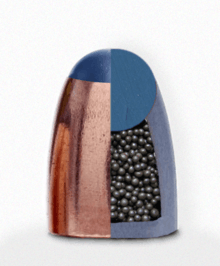Glaser Safety Slug

Glaser Safety Slug is a frangible bullet made by Cor-Bon/Glaser, a subsidiary of Dakota Ammo, an American ammunition company based in Sturgis, South Dakota. The Glaser Safety Slug was developed by Jack Canon in 1975, the same year the company was founded by Armin Glaser.
History
The original round was a hand-made hollow point bullet filled with No. 12 birdshot (0.05") with a flat polymer cap.[1][2] To improve ballistic performance, a polymer-tipped round ball was introduced in 1987, and the current compressed core form was first sold in 1988. The formulation of the polymer was also changed in 1994 to improve fragmentation reliability.[3]
Performance
The company produces bullets in calibers from .25 to .45 for pistols and from .223 to .30-06 for rifles. Each caliber comes in two forms, "blue" and "silver", the latter having greater penetrating power due to the use of no. 6 birdshot rather than no. 12.
The projectile in the cartridge is of a much lighter weight than more conventional types of cartridges and so the projectiles exit the bore at significantly higher muzzle velocities. The current bullet has a core of very tightly packed lead pellets. On impact, the bullet fractures along manufactured stress lines in the jacket—imparting all the bullet's energy very quickly rather than over-penetrating a target or ricocheting on a miss. The extreme light weight and fragility of the projectile make it unsuitable for long range firing or against protected targets.
The bullet design can produce large shallow wounds in flesh while failing to pass through structural barriers thicker than drywall or sheet metal.[4][5] These qualities make it less likely to strike unintended targets, such as people in another room during an indoor shooting. Also, when it strikes a hard surface from which a solid bullet would glance off, it fragments into tiny, light pieces and creates much less ricochet danger.
Usage
The United States Federal Air Marshal Service tested and used the Glaser Safety Slug extensively in the 1970s and 80s on board commercial passenger aircraft to defend against hijackers. Air Marshals are now issued SIG Sauer P229 pistols with a 12-round capacity firing conventional-jacketed hollow point ammunition in .357 SIG caliber.[6][7]
References
- ↑ Warner, Ken (1986). Gun Digest: 1987 Annual Edition. DBI Books. pp. 38–43.
- ↑ "Frangible Ammunition". GlobalSafety.org. Retrieved 4 September 2010.
- ↑ Ordorica, Ray (1996). Handguns 97. Krause Publications. p. 146.
- ↑ Jones A.M.; Reyna M. Jr.; Sperry K.; Hock D. (November 1987). "Suicidal Contact Gunshot Wounds to the Head with .38 Special Glaser Safety Slug Ammunition". Journal of Forensic Sciences. 32 (6): 1604–1621. doi:10.1520/JFS11220J. PMID 3430131. Paper ID: JFS11220J.
- ↑ Itabashi, Hideo H. (2007). Forensic neuropathology: a practical review of the fundamentals. Amsterdam; Boston: Academic Press. pp. 221–239. ISBN 978-0-12-058527-4. OCLC 84612004.
- ↑ Can a bullet bring down an airliner? in Worldnet Daily
- ↑ USA Today. "Air marshals thrust into spotlight".